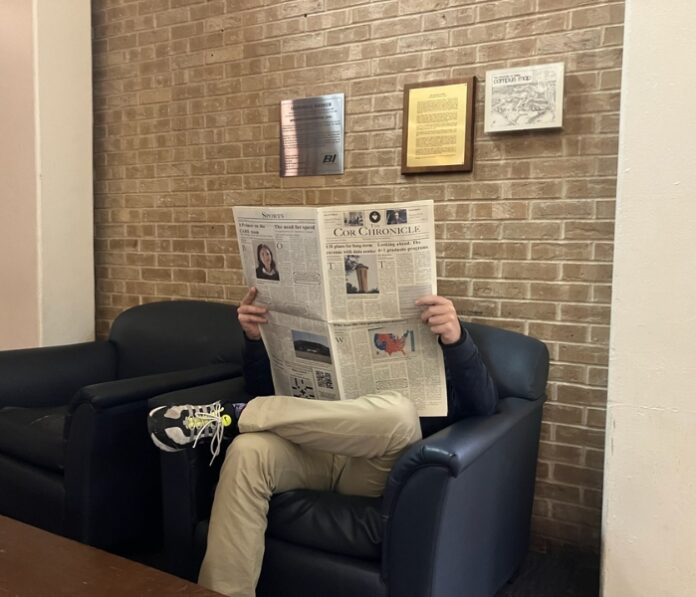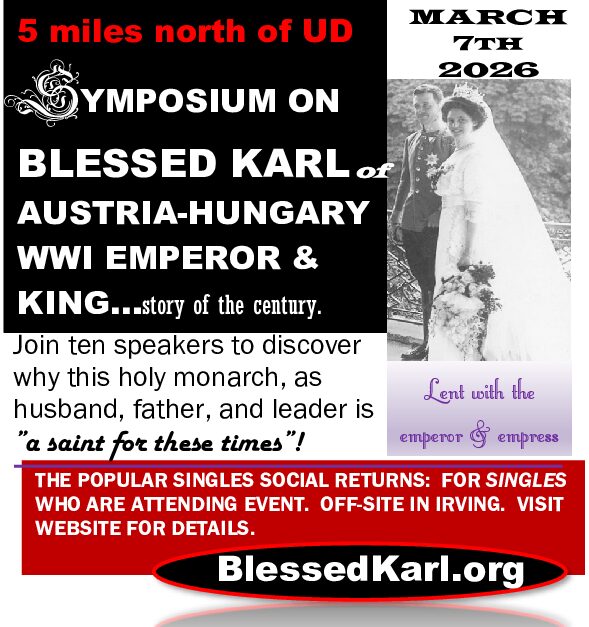Read the news!
This semester, articles on smoking, dating and Eucharistic ministry fought week after week for domination of The Cor Chronicle. Many of us at the University of Dallas appreciate our newspaper as a respite from worldly concerns and a retreat into the familiar and (mostly) friendly squabbles of our community.
However, to actually “seek ye truth and justice,” we must remember that our UD community is nestled in a larger national community, which exists in an even larger international one. Thérèse Castillo’s Nov. 13 “Letter from the Editor-in-Chief” encouraged students to offer commentary on life outside our bubble. Her article emboldened me to voice my concern, and hope, that UD students will read more national and international news.
The Cowan-Blakely Library provides free online subscriptions to the Wall Street Journal, the New York Times, and the Dallas Morning News, a combined value of about $200 per year! I claimed mine after stealing a print copy of the New York Times from a friend in class one day.
They now send me tailored digests at midnight sharp each day and update me on breaking stories when they occur, including the recent shooting of UnitedHealthcare’s CEO and the martial law turmoil in South Korea.
UD does not live completely isolated from outside conflict. By frequently inviting lauded speakers to lecture on politics, economics and history, many clubs on our campus allow students to stay in touch with foreign and domestic affairs.
However, we must truly take ownership of our informed citizenship as the First Amendment allows, through reading and discussing in our own time.
Despite finals, I would love to invite everyone to claim their free subscription to any news outlet and share what they’ve seen this week in a fun, informal conversation, held directly out front of Braniff at 4:30 p.m. on Monday, Dec. 17.
Earnest and frequent discussion of current events will likely reveal that we are not all on the same neat, crisp conservative page we believe we are. These challenges to our individual views will require humility and openness to thinking outside the box, for a Godly life cannot be lived in proud presumption of our correctness.
When Catholic readers consume politically and culturally diverse media, they grapple with the relevance and truth of their beliefs. Young Catholic readers grow especially when they must apply the truths of the faith to messy realities, like mass deportation of migrants or transgender policy struggles on Capitol Hill, without a parent to judge that policy as “right” or “wrong.”
This ultimately brings students to a more personal understanding than the one inherited in Sunday school, or even,I would argue, in UD classes which study older texts.
Many students object that reading national and international news causes unnecessary stress and anxiety. I would respond that a mature twenty-year-old should possess an understanding of their stress tolerance and stop reading when appropriate, rather than refusing political literacy altogether.
In our globalized modernity, such literacy is necessary and worth the cost. Even reading Arts or Lifestyle columns widens your scope of understanding, keeps you informed and frankly makes you far more interesting. This is also a great rule for connecting with others: in order to be interesting, you have to be interested.
Articles about on-campus conflicts and concerns catalyze great conversations about the kind of community we want to have. However, I think UD has too many sharp minds and passionate hearts to spend its talent whining about the outdoor dining policy.
When people only read news with immediate relevance to their lives, they draw the boundaries of the world wherever they choose and entrap themselves in a selfish affirmation of their existing worldview. The world can benefit so much from the minds of UD students who set it ablaze with their love for truth and ultimately for God – but students can only galvanize the world if they choose to be a part of it.

